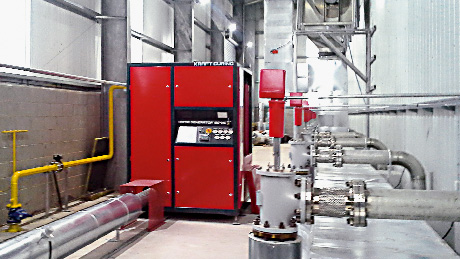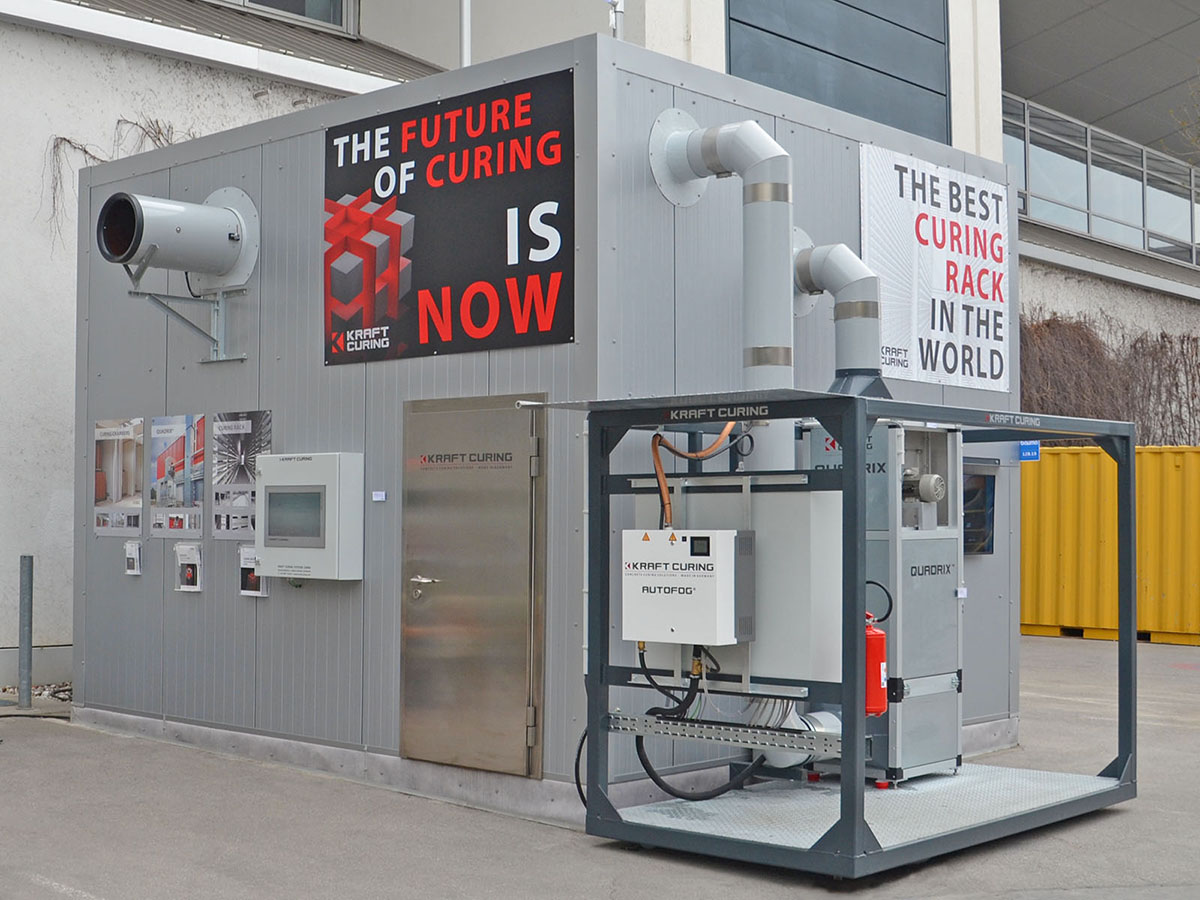Kraft Curing technologies and equipment for the controlled hardening of concrete are currently in use in a modern production facility of Van Dyk Stene, a leading manufacturer of precast concrete elements and concrete products based in Vredenburg, Western Cape, South Africa.
Kraft supplied their Kraft racks™ production pallet storage system for a total of 4,114 pallets enclosing also the transfer car area in order to provide a single atmosphere curing chamber designed for outdoor execution and wind speeds found on the Western Cape. The single atmosphere chamber design captures the heat from (cement) hydration as well as the moisture released by the concrete in order to provide a warm humid atmosphere for fresh products entering the chamber and thereby accelerating the strength gain, reducing the curing duration and cement consumption – especially in warm climates. An automatic fast operating door provides for simple and economical entry/exit for the transfer car. The racks are hot dip galvanized after production in order to prevent corrosion that is often found on racks that are coil galvanized prior to fabrication.
In addition to the rack structure and door, Kraft Curing supplied the Nautlius™ air circulation system with maximum humidity control. The air circulation system, built around the stainless steel and aluminum radial Nautilus ER2-63 ventilator (designed and manufactured by Kraft) provides a curing climate consistency equal to +/-1°C temperature, +/-3% relative humidity with an air velocity equal to under 1 m/sec. The system includes an exhaust ventilator, operated by a hygrostat humidity sensor. If the humidity inside the curing environment increases above 95%, the exhaust ventilator extract the humid air until the set-point humidity is reached.
“We are now able to achieve the same strength requirements, but with 30% less cement than our traditional production method. Early strength (ex-chamber) are equal to 35 MPa (N/mm²) with the reduced cement loading. A cost savings that will have a significant impact on the bottom line. In addition we see uniform colors, strengths and a denser surface due to the better cement hydration” said Mr. Andre van Dyk, Van Dyk Stene managing director.
Frugal/Value Innovation
While Kraft supplied the curing racks, steel rails, fast operating door, air circulation ventilator and control systems, the chamber insulation and the air distribution duct system were supplied and installed locally per Kraft Curing drawings, bills of materials and supervision. As part of its “frugal” or “value” innovation concept, Kraft worked together with PMSA, their South African distributor, and Van Dyk Stene in order to source local high quality materials; providing work for the local economy, value and ease of procurement for the customer and less transport and environmental cost.
“Whether it is Australia, the Emirates, India, Indonesia, South Africa or the United States, It really is silly to transport air duct, insulation panels and many other items from Germany half way around the world when there are eager, affordable and able local suppliers;” comments Michael Kraft, Managing Director of Kraft Curing.
Other products in Kraft Curing product catalog
Other than the Kraft Racks™ and the Nautilus, Kraft Curing systems also supplies other products like Convect-Air®, Concrete curing tents, Hot rocks®, Insulated curing chambers, Kraft T-Rex, Nautilus™ D.I.Y. Kit, Quadrix®, Tarp Roller, Thermalcure®, Vapor Curing I, Vapor Curing II.

Applications
Kraft Curing products are applicable in manufacture of Concrete Block, Concrete Block Paving, Concrete Bridge Segments, Concrete Cast Stone, Concrete Flags/Slabs, Concrete Pipe, Concrete Roof Tiles, Concrete Sleepers, Concrete Weight Coated Pipe, Precast Concrete Drainage Products, Precast Concrete Hollow-core, Precast Concrete Tunnel Segments, Precast Concrete Walls and Ceilings, Prestressed Concrete, Veneer Stone and Wet cast concrete.
Conclusion
According to Daniel Rafter, Sales & Engineering specialist at Kraft Curing Systems GmbH, concrete producers spend a small fortune on various equipment, facilitating the control of the production processes; from careful batching of raw materials to the hydraulic and vibration-pressing of the raw materials into concrete products.
Often the hardening process is left to chance, with only a basic rack structure employed, where the product is drying instead of curing. By implementing a true curing system, this is the only way you can fit the missing piece into the process, and take control from the start to finish.

Leave a Reply